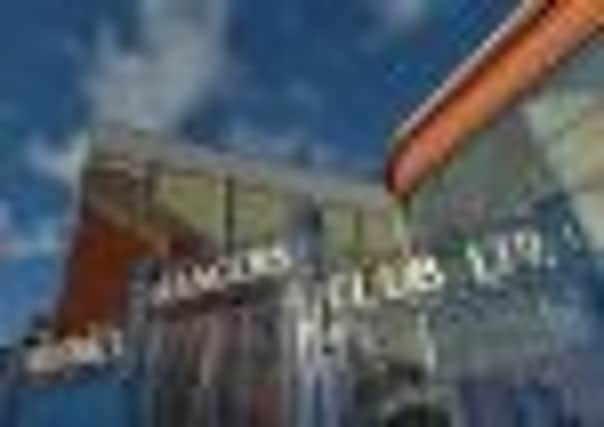Charles Green upbeat after Rangers £7m loss


But, Charles Green, chief executive of the new Rangers International Football Club, said the results were in line with company guidance in the run-up to the stock market flotation in
December 2012. That cash-raising followed the stricken club being bought out of administration last summer. Of the losses, Green said: “Given that the club is in the unprecedented situation of playing in the Third Division, there is, at this stage, a clear impact on a range of revenue streams, particularly in broadcasting and with the absence of European participation.”
Advertisement
Hide AdAdvertisement
Hide AdRevenues of £9.5m were outpaced by operating expenses of £16.6m in the seven-month period to 31 December since the new company was incorporated. Brian Stockbridge, chief financial officer, said expenses included roughly £3m of cumulative match-day costs, £2m of the general running costs of the stadium, about £1m of legal fees in connection with defending various actions, including the possible stripping of Rangers’ titles, which was averted last week, and £1.6m “investment in football personnel in line with strategy”. Green said that, as part of the ongoing turnaround of Rangers, the player wage bill had come down from £27 million to just over £7 million in the trading period. He said that in the second trading half that bill was targeted to come down further to about £5 million on an annualised basis. Stockbridge said the half-time loss would “not come as a surprise” to shareholders who took up shares in the float, as the outcome was made clear in the prospectus.
Rangers made a ‘headline’ pre-tax profit of £9.5m, the result of an “accounting adjustment” following a statutory revaluation of its assets. When the club was floated on the London Stock Exchange, it raised more than £22m, about £17m from institutional investors in the City and £5m from the fans.
Green said that the silver lining to the adversity faced by the club in recent times was the “galvanising effect” on supporters. During the period, Rangers sold more than 38,000 season tickets, while the average home league attendance was 45,363. Rangers also announced new marketing and sponsorship agreements last week with Mike Ashley’s Sports Direct sports retailer, kit manufacturer Puma and Blackthorn Cider. “This has been a significant period in the club’s history, in which vital steps were taken to ensure the survival and rebuilding of one of the UK’s most venerable football institutions,” Green said. “The priority for the company to date has been to stabilise the business and put in place solid financial foundations for the future.”
Rangers had cash in the bank of £21.2m as at December 2012. Green said: “Few football clubs today can take comfort from having positive cash balances, which will be spent wisely.”
Stockbridge said cost control also remained a priority on the non-playing side. He said taking matchday security in-house had saved Rangers about £200,000 a year, with a similar amount saved from streamlining management of facilities at the club. However, he added: “We have not cut staff or infrastructure [at Ibrox]. It needs to be run properly. We will invest in the club.”
Rangers have said they plan to transform the ground floor of Edmiston House, adjacent to the stadium, into a 10,000 square foot shop selling club merchandise, with a private members’ club and bar on the upper levels.
Rangers said they also continued to progress with their legal action against club players who had objected to the transfer of their contracts to the new entity.
Revenues from retail sales in the seven-month period were “disappointing”, the club admitted, mainly due to Rangers’ club sponsor JJB Sports going into
Advertisement
Hide AdAdvertisement
Hide Adadministration. Explaining why he felt it was pointless to chase JJB for royalty payments due, Green joked: “I might as well have chased a London taxi and got more satisfaction.”
The chief executive also said he believed there was a good chance Rangers would not have to pay top-dollar if it eventually pursued their desire to play in the English football league through litigation. “This would be so huge that we are convinced whichever lawyer would choose to go down that route we would get a good deal out of it. It would be creating legal history and so they might not charge their normal rate,” Green said.
Meanwhile, Malcolm Murray, group chairman, praised the good start made to the turnaround of the club, originally formed in 1872. Murray said: “In my 30 years investment experience, I have never seen a business move from the liquidation of one company to another’s successful flotation in such a short space of time.”
Rangers shares closed unchanged at 79.75p, but currently trading 14 per cent above the 70p December flotation price.